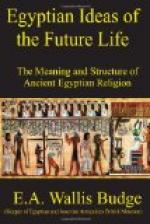meals [are brought unto thee] by the spirits who are
in thy following, and water is sprinkled ... on
each side of the souls of the dead in this land.
Every plan for thee which hath been decreed by the
commands of R[=a] from the beginning hath been perfected.
Now therefore, O son of Nut, thou art crowned as
Neb-er-tcher is crowned at his rising. Thou
livest, thou art stablished, thou renewest thy youth,
and thou art true and perfect; thy father R[=a] maketh
strong thy members, and the company of the gods
make acclamations unto thee. The goddess Isis
is with thee and she never leaveth thee; [thou art]
not overthrown by thine enemies. The lords of
all lands praise thy beauties, even as they praise
R[=a] when he riseth at the beginning of each day.
Thou risest up like an exalted being upon thy standard,
thy beauties lift up the face [of man] and make
long [his] stride. The sovereignty of thy father
Seb hath, been given unto thee, and the goddess
Nut, thy mother, who gave birth to the gods, brought
thee forth as the firstborn, of five gods, and created
thy beauties and fashioned thy members. Thou
art established as king, the white crown is upon
thy head, and thou hast grasped in thy hands the crook
and whip; whilst thou wert in the womb, and hadst
not as yet come forth therefrom upon the earth,
thou wert crowned lord of the two lands, and the
‘Atef’ crown of R[=a] was upon thy brow.
The gods come unto thee bowing low to the ground,
and they hold thee in fear; they retreat and depart
when, they see thee with the terror of R[=a], and the
victory of thy Majesty is in their hearts.
Life is with thee, and offerings of meat and drink
follow thee, and that which is thy due is offered up
before thy face.”
In one paragraph of another somewhat similar hymn
[Footnote: See Chapters of Coming Forth by
Day, p. 342.] other aspects of Osiris are described,
and after the words “Homage to thee, O Governor
of those who are in Amentet,” he is called the
being who “giveth birth unto men and women a
second time,” [Footnote: The words are mes
tememu em nem.] i.e., “who maketh
mortals to be born again.” As the whole
paragraph refers to Osiris “renewing himself,”
and to his making himself “young like unto R[=a]
each and every day,” there can be no doubt that
the resurrection of the dead, that is to say, their
birth into a new life, is what the writer means by
the second birth of men and women. From this
passage also we may see that Osiris has become the
equal of R[=a], and that he has passed from being
the god of the dead to being the god of the living.
Moreover, at the time when the above extracts were
copied Osiris was not only assumed to have occupied
the position which R[=a] formerly held, but his son
Horus, who was begotten after his death, was, by virtue
of his victory over Set, admitted to be the heir and
successor of Osiris. And he not only succeeded
to the “rank and dignity” of his father
Osiris, but in his aspect of “avenger of his




